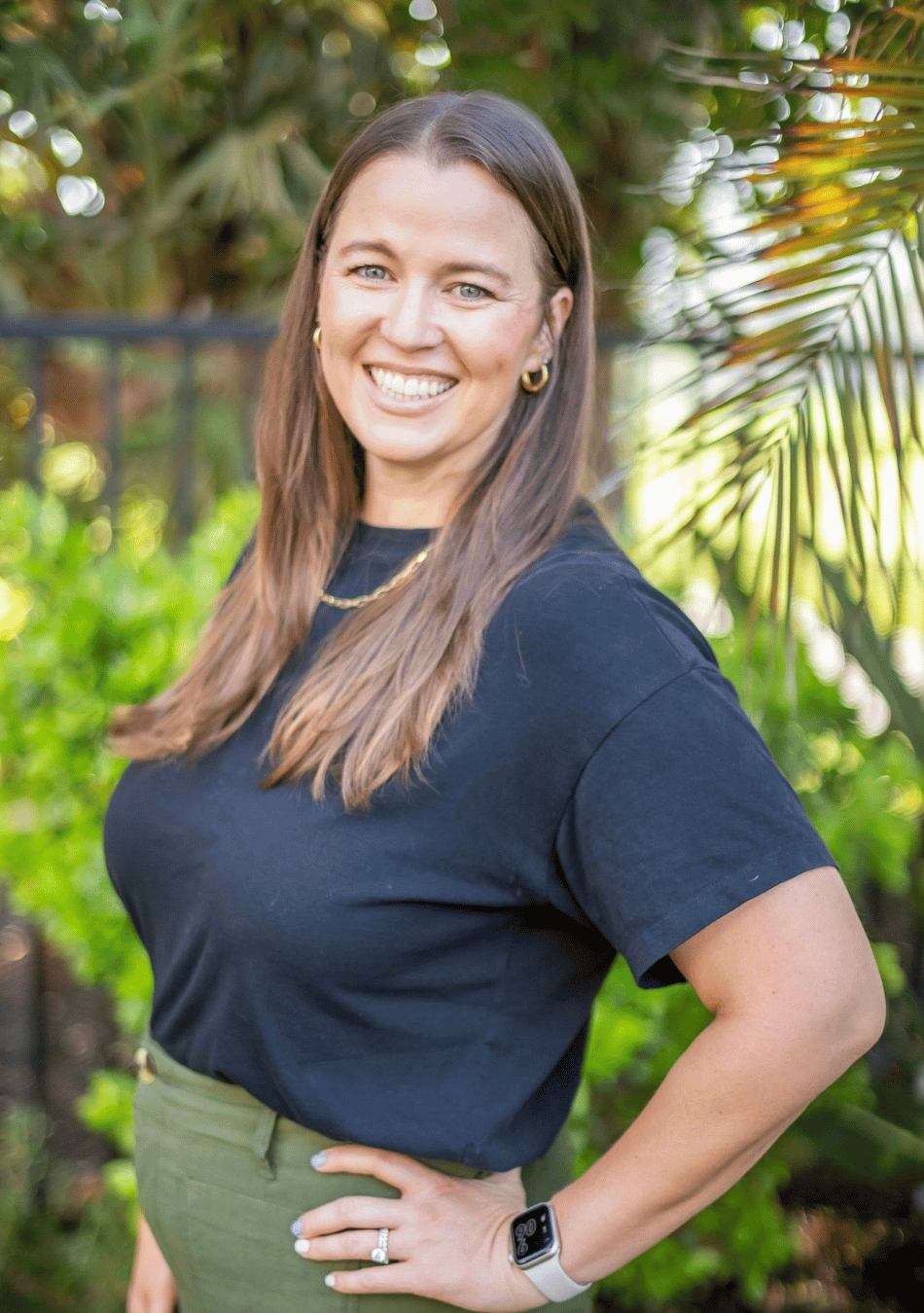I'm Allison Barton, a Licensed Marriage and Family Therapist located in San Diego, California. I specialize in working with clients who identify as perfectionists and high-achieving individuals.
Top-Rated San Diego ACT Therapist Allison Barton
Therapy to help you move forward with purpose & intention
I have 10 years of experience working with clients who present with different clinical issues, including perfectionism, anxiety, depression, and trauma.
I offer in person sessions in San Diego, as well as virtual sessions across California so therapy can fit into your busy life.
I am trained in Acceptance and Commitment Therapy and utilize the modality to guide my clients to explore their emotions and beliefs while also teaching them to be mindful and emotionally grounded. I help my clients manage uncomfortable emotions and make changes that create a more meaningful life.
I am certified in Eye Movement Desensitization and Reprocessing therapy and integrate this modality with ACT to help clients take committed action in their lives to align with their values, while accepting aspects in their lives that they cannot change currently.
I am values driven as a therapist, meaning I help my clients identify what is truly important in their lives and guide them toward making decisions in their lives that align with their values.
I am a trauma-informed therapist, meaning that I prioritize my client's emotional safety during sessions and guide clients toward healing trauma symptoms they have experienced without re-traumatizing clients.
I am both compassionate and direct in my work with clients and strive help my clients feel understood while gently challenging them when necessary.
Meet Allison Barton, LMFT
Expert ACT therapist in San Diego
I am a licensed therapist with specialized experience in Acceptance and Commitment Therapy (ACT). I have completed extensive training in ACT techniques and have spent several years implementing this approach with my clients. I help my clients build psychological flexibility, which helps them stay grounded, be open to the emotion they are experiencing, while taking actions that are aligned with their values. My ACT-based work emphasizes learning self-compassion, practicing the ability to stay present, and facing discomfort, all of which help my clients move toward a life that feels meaningful and authentic.
Credentials:
Licensed Marriage and Family Therapist (LMFT) – California
Certified EMDR Practitioner/Therapist
Clientele: Individuals and Adults (primarily women)
Location: 1455 Frazee Rd, Suite 500, San Diego, CA 92108
Virtual Therapy: Yes
My approach to ACT
As a therapist, I integrate Acceptance and Commitment Therapy and EMDR to guide clients through work to reduce trauma and perfectionism. ACT offers powerful tools to help clients build psychological flexibility through the six core processes of ACT, including learning to practice acceptance, unhooking from self-critical thoughts, allowing space for uncomfortable emotions, and taking committed actions that are aligned with their values.
If you're navigating perfectionism, anxiety, and trauma, ACT supports the shift from attempting to control or avoid issues you experience toward compassion and courage. ACT helps clients heal without having to feel as though they're perfect first. EMDR helps to reprocess specific traumatic memories and change negative thoughts into more adaptive beliefs.
How to get started
If you're interested in ACT therapy, here are 3 quick steps to getting started in the process of feeling comfortable in your life again:
Schedule a Consultation Call
I ask that each client who is interested in working with me schedule a free 15-20 minute consultation before we begin to work together. This is so you can discuss your specific goals and symptoms, as well as ask me any questions you might have about the therapy process. It also allows new clients and myself to assess whether we would work well together, saving you time in the long run.
Fill Out an Intake Packet
My intake packets discuss my practice policies in detail so there are no misunderstandings when we are working together. The intake packet also allows you to discuss your history and symptoms related to your current concerns in more detail than we are able to discuss in the initial consultation.
Begin therapy!
After the initial consultation and intake packet are completed, you're ready to start therapy. We will schedule a time that works for both of our schedules to meet and we will discuss the frequency of sessions you desire, as well as my recommendation.
Common reasons why people start ACT
There are several reasons an individual might seek out therapy, including anxiety, depression, problematic relationships, difficult thoughts, or seeking strategies for how to manage aspects of your life more effectively. Some common reasons why clients seek Acceptance and Commitment Therapy specifically are:
-
There are several books that support individuals working through the basic tenets of ACT in a self-guided manner. Some people find great help from the books alone, while others seek an ACT therapist for deeper and more personalized guidance.
-
Many people seek ACT therapy because they cognitively understand changes that could help them but they feel paralyzed when attempting to implement the changes. These people are helped by personalized guidance and suggestions from a therapist who can help them troubleshoot issues as they arise.
-
Some mental health conditions can be chronic, meaning that they continue to show up in a person's life despite previous attempts to resolve them in therapy. ACT therapy can be helpful in this case because it can guide clients to recognize their struggles and accept them, rather than avoiding them. Therapists who utilize ACT can then help clients take committed action in their lives that make them feel better without completely reducing symptoms they're experiencing.
When another practice might be a better fit for your needs
Not every therapist will be a good fit for every client- and that's okay! Therapy is a deeply personal experience and finding someone who's style and approach to therapy make you feel safe and comfortable is vital to therapeutic success. There are certain situations and mental health concerns that I don't specialize in and encourage you to seek a different avenue for healing, including:
-
When a client is experiencing suicidal ideation or homicidal ideation, often they need more support than therapy once a week. For this reason, I do not work with clients who are actively suicidal or homicidal. Please call 998 if you are experiencing these issues and a trained professional can help you find a therapist who would be a good fit for you.
-
Individuals who are experiencing active psychosis, including hallucinations and delusions, often benefit from a combination of mental health therapy and medical supervision to stabilize their condition. These concerns fall outside the scope of my training and expertise, so I do not provide therapy for them in my practice. I encourage you to reach out to your insurance company for further resources and recommend the following resources:
UCSD first psychosis episode program
UCSD first psychosis episode program
-
Eating disorders are complex because they require a treatment team, usually including therapists, social workers, doctors, and psychiatrists. I advice seeking support from treatment teams who specialize in eating disorders (UCSD eating disorder program or Rady Children's Hospital for child/adolescent eating disorders).
-
If you are struggling with substance use or abuse currently, you may need combined approach from therapists and doctors to help you detox safely. For this reason, outpatient therapy services may not be appropriate until you are medically stabilized. Here are some resources to consider:
Sharp Health Care substance abuse program
Newport Academy for teens struggling with substance abuse
Pride Detox for LGBTQIA+ specific substance abuse treatment
Call SAMHSA's national help line
San Diego County's substance abuse outpatient programs
Sharp Health Care substance abuse program
Newport Academy for teens struggling with substance abuse
Pride Detox for LGBTQIA+ specific substance abuse treatment
Call SAMHSA's national help line
San Diego County's substance abuse outpatient programs
FAQs about ACT Therapy
-
Acceptance and Commitment Therapy is based on the choice point idea, which is that we are always making decisions and we can choose to make decisions that move us towards the life we want or away from the life we want. ACT helps clients learn to stop avoiding painful emotions and think about emotions differently so they don't control your life. When participating in ACT therapy, you will learn to identify your thoughts and feelings without getting caught up in them, stop avoiding discomfort, identify personal values that are important to you, practice being in the present moment, and make committed action towards things that are important to you.
If someone has anxiety, they would be able to identify anxious thoughts and feelings without spiraling about their anxiety when their mental health counselor is using ACT. They would also learn to speak up about things that are important to them, even though it makes them feel anxious. A person with anxiety would learn how to cope with feelings of anxiety in a way that does not control their life when guided by an ACT therapist.
-
There are several different modalities of therapy that fall under the umbrella of cognitive behavior therapy. Cognitive Behavior Therapy is the original model developed by Aaron Beck and Acceptance and Commitment Therapy is another modality that falls under the broader family of cognitive behavior therapies.
However, CBT and ACT also have many defining differences that would lead someone to prefer one modality over the other.
-
The main goal of Cognitive Behavior Therapy is to identify, challenge, and replace cognitive distortions (negative thoughts). CBT focuses on changing unhelpful thoughts so you feel better. The modality also aims to reduce or manage uncomfortable emotions.
-
The main goal of Acceptance and Commitment Therapy is to accept what you feel and choose to take action to change things that really matter to you. ACT works through increasing psychological flexibility. ACT clinicians teaches patients to practice mindfulness, acceptance, and distance themselves from their thoughts through a process called cognitive defusion.
Typical ACT sessions will focus on one or more of the six core processes of ACT, which include acceptance, cognitive defusion, present moment awareness, self-as-context, values, and committed action. Together, these six processes create psychological flexibility.
If you're unsure whether ACT would be a good modality for you, feel free to reach out for a consultation so we can talk about your individual goals and I can help you decide.
-
Yes, ACT therapy is highly effective. Studies have shown that ACT is highly effective for a range of mental health conditions, including anxiety, depression, substance use, and general stress. Research has shown that ACT is also effective in treating OCD, PTSD, and eating disorders. Another study discusses the effectiveness of ACT on reducing the negative impact of comorbid medical and mental health conditions.
I have utilized ACT in my practice for years and find it to be highly effective in helping my clients accept issues they cannot change, manage difficult emotions, manage distressing thoughts, and feel more comfortable managing the issues that arise in their daily lives.
Start working with a San Diego ACT therapist today
I am committed to guiding my clients towards making effective change in their lives by identifying core values and helping clients make choices that move them towards their values. ACT can be a helpful modality to explore and utilize if you've been involved in several different forms of therapy but remain unhappy with your progress. If you're interested in beginning ACT with a therapist who will skillfully integrate the core processes into your therapeutic journey, schedule your initial consultation today!


